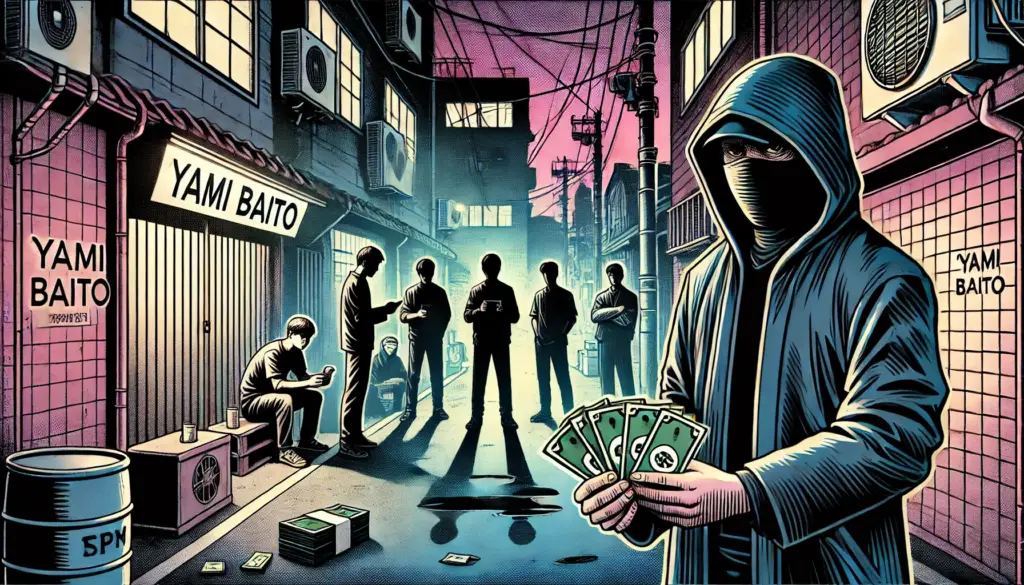
In recent years, a disturbing trend has emerged in Japan: a growing number of young people are turning to yami baito—illegal or semi-legal underground part-time jobs—as their only perceived path out of poverty. With flashy promises of fast money and minimal effort, these jobs lure desperate youth into a dangerous trap. But what’s really driving this shift? And why do so many find themselves unable to break free once they enter?
This article explores the root causes behind this phenomenon, the socio-economic pressures on Japan’s younger generation, and how society is inadvertently reinforcing a cycle of desperation. We’ll also discuss potential ways forward, both for individuals and policymakers.
💡 What Is “Yami Baito”?
“Yami baito” (闇バイト) translates to “dark part-time jobs.” These are not merely under-the-table gigs—they often include high-risk, criminal tasks such as:
- Bank account rentals and identity lending
- Package deliveries of illegal substances
- “Special collection” services (shady debt retrieval)
- Online fraud operations (e.g., phishing scams)
- Acting as drop-off runners for fraud groups
Often promoted through social media, anonymous message boards, or Telegram-style apps, these jobs disguise themselves as easy, one-time gigs. But many recruits quickly realize they’ve entered a world with no safety net—and no exit.
📉 The Financial Reality of Japan’s Youth
Japan is no longer the shining “economic miracle” it once was. The younger generation faces a crushing set of financial pressures:
- Wages have stagnated for over two decades.
- Non-regular employment (part-time, temp) accounts for over 40% of youth jobs.
- Tuition and student loan debt have risen, without a corresponding increase in earning potential.
- Inflation and a weak yen have made even basic necessities feel unaffordable.
Add to that a cultural expectation of financial independence in one’s twenties, and many young people feel the need to “hustle” by any means necessary.
📱 Social Media: The Gateway to the Underworld
Modern yami baito isn’t found in shady back alleys—it’s a few taps away on a smartphone.
Recruiters often post vague messages like:
“No experience needed. Make ¥100,000 in a single day. DM me anonymously.”
They offer encrypted communication channels, quick payments, and minimal explanations. But once you engage, the process quickly becomes coercive. Some recruiters blackmail participants with personal data. Others entrap them by involving them in fraud rings without their full knowledge.
🔒 Why They Can’t Just Quit
Escaping yami baito is not as easy as it sounds. Here’s why:
1. Debt Trap
Many young people initially join to pay off debt. But some jobs involve fines for “contract breaches,” and quitting mid-task may incur new debt—or threats.
2. Fear of Police
If someone has already committed a crime, even unknowingly, they may fear turning themselves in. The stigma and legal consequences make escape psychologically and socially daunting.
3. Lack of Support Networks
With weak welfare safety nets and strained family relationships, many feel they have no one to turn to. Japan’s “self-responsibility” culture can make asking for help feel like a failure.
4. Gradual Escalation
Yami baito often starts with seemingly harmless jobs—flyer distribution, minor tasks—but gradually escalates into illegal acts. By the time they realize the risk, it’s too late.
🧠 A Deeper Social Breakdown
The rise of yami baito is more than just an economic story. It reflects a deeper societal crisis:
- Alienation and isolation are rampant among Japanese youth, especially in urban areas.
- School-to-career pipelines have eroded, leaving many without a sense of direction.
- Mental health stigma discourages those in crisis from seeking help.
Even public campaigns that warn against yami baito often focus on punishment—further stigmatizing the already vulnerable rather than addressing root causes.
🔄 What Can Be Done?
✅ For Individuals:
- Know the warning signs. If a job pays too well and doesn’t require identification or interviews, it’s probably illegal.
- Seek free legal consultation. Many NPOs and bar associations offer anonymous help.
- Connect with support groups. Online communities for NEETs, hikikomori, or debt counseling can be safer alternatives than isolation.
🏛 For Policymakers:
- Strengthen youth safety nets—including housing aid, mental health services, and job matching for low-income individuals.
- Regulate online recruiting channels more tightly and penalize repeat offenders.
- Create safe exit routes for people involved in underground work, including amnesty programs.
✍️ Editor’s Perspective: “The Hustle Culture of Despair”
In a country where working hard used to guarantee stability, young people now face the opposite: long hours with little reward, unstable jobs, and a shrinking future. Yami baito offers the illusion of control—but it comes at the cost of safety, legality, and dignity.
What Japan needs is not more punishment, but more compassion—and policies that reflect the reality of being young and broke in 2025.



















































